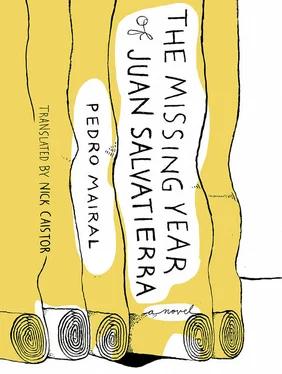“If you don’t want to come, I’ll go on my own tomorrow,” I said to end the discussion, and went to my room.
I heard him prowling around the house for a while, then I fell asleep.
I woke up very early, when it was still dark. I sipped some mate tea in the kitchen, wondering how on earth I was going to get across the river in a motorboat. I would have to cycle all the way up to Gervasoni’s quay again. Yet I was determined to do it. I had a shower, and put on the last change of clean clothes I had left. Then I went out into the yard to get my bike. I have to admit that because I was angry with my brother I made more noise than necessary. I put a few crackers in a bag, and went to the front door. Just as I was going out, Luis appeared, looking disheveled, without his glasses, and in his pajamas. The notary in pajamas, I thought. I hadn’t seen him like that for at least twenty years. “Wait for me,” he said.
He dressed, had a cup of coffee, and we left in his car. Day was just breaking over the river.
“Listen to me,” he said, “OK, so we’ll go across by boat. But if we don’t find this Ibáñez by noon, we come back.”
“No problem. We have to be here by this afternoon to prepare the barbecue anyway,” I said, to keep him calm.
It took us ten minutes to cover the distance that had taken me an hour riding my bike the day before.
We left the car near the Customs post and boarded a boat that was supposed to be leaving at seven but finally got under way at a quarter past eight, because it was waiting for some cargo from Concepción. It was the same man on board as on the previous day. He charged ten pesos for the two of us. I asked him if he knew Ibáñez, and he said he hadn’t seen him for a long time, but that he was usually to be found in a place called El Duraznillo.
The river turned golden before the sun came up. As the water slid around, the surface looked like giant sheets of metal shifting at different speeds. When the boat pulled away from the shore, we could feel the force of the river. The engine strained and spluttered with its prow pointed diagonally across the current, and yet the river still gained on us, pushing the boat to the south.
We saw a yacht sail by, then a Coast Guard boat shot past, with most of its hull raised out of the water.
We went up to the prow and leaned on the rail. Luis remembered a soccer championship we had played as youngsters against teams from Paysandú on the Uruguayan side of the river. Wearing our team jerseys, we’d crossed a couple of times in a diesel barge we always thought was about to sink.
We stood silently for a while, staring down at the water curling round the hull. We passed two men in a canoe, and were passed in turn by a dinghy with an outboard motor carrying a family and their furniture. That made me think of Salvatierra smuggling goods across at night with Jordán. The river wasn’t so wide after all, and on the far side it was another country, with other laws. I gripped Luis by the arm.
“I’ve got an idea.”
“What’s that?”
“The canvas can’t get out of Argentina?”
“Well no, it can’t.”
“But it could get out of Uruguay…”
Luis stared at me.
“What do you mean?”
“We transfer it to Uruguay and send it to Holland from there.”
“We ‘transfer’ it?”
“Yes, we transfer it.”
Luis’s face brightened.
“That’s not a bad idea at all,” he said, and we both laughed.
The low, wooded cliffs of the Uruguayan coast came closer, until we could make out a landslide, the big clumps of whitish earth down by the water. We disembarked in a port that was new to both of us. A Uruguayan Customs officer asked to see our documents, then we got off without knowing where to head.
A man came up offering us a taxi. We asked him if we were far from El Duraznillo, and he said about fifteen minutes. He drove us along a gravel road; from the low houses on each side we could tell we were in a different country: they had neat flowerbeds with flowers and plants in them. It took us over fifteen minutes to get there. El Duraznillo was a cluster of houses beside a path that ended in the river.
Asking the taxi driver to wait, we banged on the door of a closed store. A woman came out drying her hands on a dish towel. We inquired if she knew where Ibáñez lived, and she said he was on the coast, in a plot of land owned by the municipality, beyond Los Linares ranch. She had to explain how to get there because we didn’t know the area.
It would have been easier to go along the river, but there was no one who could take us, and so Luis and I climbed back into the taxi. He drove along a dirt road, talking politics the whole time and glancing at us in his rear-view mirror to see if we would respond. But neither of us encouraged him. We were as silent as two hit men: although we didn’t look dangerous, the driver was unnerved by us. Perhaps that’s why the guy never stopped talking.
The road was pretty bad, and the car bounced over the dry potholes. We went past a ranch called Los Lanares. (I thought the woman had said “Los Linares.”) There was an entrance that was blocked with a loose chain and padlock. We got out. We tried to see if we could lift the chain so the car could pass underneath, but it was impossible. We would have to walk down to the river. The driver didn’t want to wait for us. We could understand him not wanting to stay there, in the blazing sun. Luis paid him for the journey and something in advance for him to come and collect us two hours later, at the same spot.
We set off down the white path, crossing a field with a few sparse trees in it. We weren’t wearing shoes for walking over rough ground. I had on a pair of loafers; Luis was wearing smart shoes that were soon covered in dust. He began to run out of breath, and asked if we could rest for a while. He wiped off the sweat with his handkerchief. Angry at our invasion, some lapwings skimmed over our heads. They had a point. What were we doing out here in the middle of nowhere beneath a sun that was already warming our backs?
As we approached the river, the trees grew denser. The shore couldn’t be far off. We carried on walking and it wasn’t long before we reached a small brick-built house alongside some posts that had once been a corral. We saw a man stripping an engine outside, and asked him where Ibáñez lived. He told us to carry on until we reached the river, then to continue along the shore until we saw an old bus. That was where we could find him.
We bordered a field of stubble, then a pond covered in water hyacinths, a patch of thorny undergrowth, and finally came out on to the riverbank. It was odd to see the river from the other side, as though it were flowing in the opposite direction, as if the water were rising and time was flowing backwards. We walked along the shoreline, crossed a barbed wire fence and eventually caught sight of a gray bus with no wheels, held up on four barrels, and with a metal awning projecting from one side. We went closer and clapped our hands. Nobody. There was no boat tied up in the water. We decided Ibáñez must be out fishing.
We sat on a couple of crates in the shade of a tree near an extinguished fire. We talked a bit about how we could get the sixty-five rolls of the painting over to this side of the river. We would have to find a boat, a smuggler willing to make several trips. We would have to see. We ate the crackers I’d brought in the bag. More than an hour went by.
We were already planning to make our way back when a man appeared in a boat downriver. He was whistling a tune absent-mindedly. We couldn’t see his face beneath the broken brim of his hat. When he spotted us, he used the oar to slow the boat down, and peered at us from a safe distance. He looked too young to be Ibáñez.
Читать дальше












